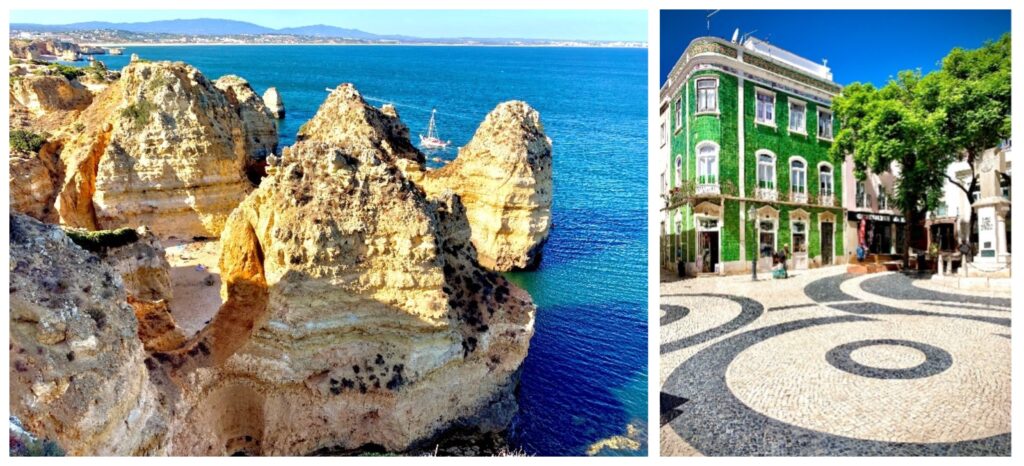A European Lifestyle Is Easier to Obtain Than You Think…
Can one ever tire of sangria? Is it even possible?
I’ve just finished my first week as a resident of Portugal, and I cannot recall a single lunch or dinner that did not include sangria. I had my first white sangria at lunch yesterday here in Lagos, one of the most popular destinations along the southern Algarve coast. We drove here to spend a few days on a mini seaside vacation while we awaited the arrival of our furniture and such.
My wife, Yulia, tapped out on Sunday, telling me that morning that “I can’t do anymore sangria.” Which I guess kinda negates my introduction. Turns out one can tire of sangria…
Such a weak constitution for a woman born in the former Soviet Union! Lenin definitely weeps in his tomb.
Me? Frankly, I’m quite happy nibbling on tapas and some of the freshest seafood I’ve had since leaving Louisiana in 2017… all washed down with a cup or two of sangria. Nothing overboard—just a pleasant, fruity wine drink with my food.
None of this, of course, is particularly important to anything other than my lifestyle these days… which is the point of today’s dispatch: lifestyle abroad.
As Yulia and I tooled around Portugal over the last week, I’ve regularly been struck by one particular thought: If Americans knew what they’re missing in Portugal, they’d be invading Portuguese embassies across the U.S. in a hunt for a residence visa.
This place really is special.
In many ways, it feels like home—I mean, assuming you’ve been to Southern California, or Napa or Sonoma, or the Rocky Mountain foothills. The scenery is picturesque, and outside of Lisbon and Porto, the two big cities, most of the towns feel much more like villages—but in a way that offers access to everything you’d want or need.
The food is not all that different. Fresh tuna steaks. Grilled seabass. Clams in a buttery wine and garlic sauce. Sweet, salty oysters that compete with those from the Gulf Coast. Grilled chicken, with or without the spicy piri-piri sauce. Steaks. Lamb chops. Fantastic seafood risottos and excellent house wines that are $3 or $4 per glass and which would stack up against or exceed the $12 and $15 glasses of wine back in the States.
In short: You’re certainly not going to starve here or wonder what you can eat.
The temperature all along the coast—Algarve in the south to Porto in the north—is mild and breezy. The highest I’ve experienced so far is 86 degrees F. When the wind’s not blowing, you feel the heat, but it’s not horrible like the 90- to 100-degree weather that slams America every summer. And with the sea breeze (sometimes strong ocean winds) you can actually catch a bit of chill on a late July afternoon.

Now, even though I’m rambling about Portugal, this is really about that bigger notion of “lifestyle” and how to upgrade said lifestyle by thinking beyond America’s borders.
Expats I know in Panama, Uruguay, Mexico, and Thailand would—and do—share many of those same sentiments.
For lots of Americans, however, Europe is the promised land, either for living and working, or for retiring. There are cultural similarities… historical family ties… the ease with which most Europeans can converse in English… and the fact that European countries rank so highly in terms of safety, happiness, healthcare… I mean, lots of reasons exist to want to call Europe home.
To that end, I’m going to be talking about all of this at International Living’s quickly approaching Ultimate Go Overseas Bootcamp in Denver in September. I’ve put together a presentation that addresses lifestyle options on the continent, visa options, and the speed at which you could actually be living in Europe. (Hint: I was officially living in Europe less than two months after I made the decision to relocate to Prague, the Czech capital, my first stop in my Great European Adventure.)
I want people to know just how easy it can be to chase a European lifestyle—in Portugal and beyond.
You could just as easily be living on a Greek island… or in the heart of Provence, France… or under a Tuscan sun in Italy… or running with the bulls in some Spanish town. There are so many options, really, whether that’s urban, rural, mountain, or seaside living.
For me and Yulia, Portugal made the most sense. She grew up on the Black Sea and wanted to return to living by the water. I wanted a country where I could gain access to a European Union passport in as short a time as possible. Live here in Portugal for just five years, and you’re eligible for a local passport, which is an EU passport that then gives me work and residency rights across the entirety of the European Union.
Which underscores the point of my presentation: Europe offers a lifestyle for everyone, and it’s very often cheaper than you think, and easier to obtain than you might imagine.
Now, if you’ll excuse me, it’s pushing up against 6:30 p.m. here. Dinner beckons… and a nice glass of sangria awaits.
Not signed up to Jeff’s Field Notes?
Sign up for FREE by entering your email in the box below and you’ll get his latest insights and analysis delivered direct to your inbox every day (you can unsubscribe at any time). Plus, when you sign up now, you’ll receive a FREE report and bonus video on how to get a second passport. Simply enter your email below to get started.
